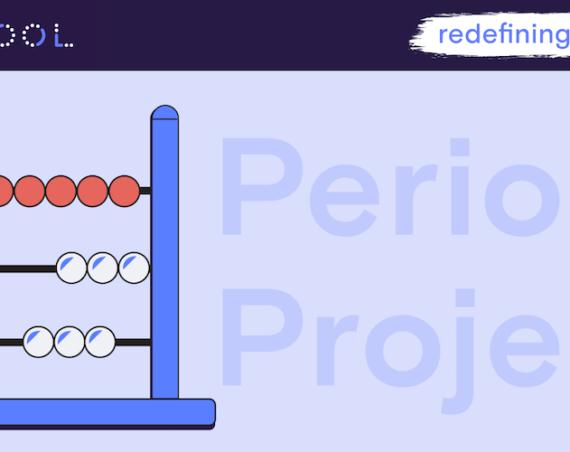In our “Starter Story” series we invite femtech founders to share their stories of how it all began. How did they come up with the idea? Where did they meet their cofounders and what was the hardest part of going from 0 to 1?
In today’s Starter Story we get to share Vulvani‘s founding story as told by founder Britta Wiebe. The goal of Vulvani is to fight taboos and normalize periods. The focus lies in education about menstruation and the menstrual cycle.

When did the idea for your startup first come up?
During my twenties, I spent a lot of time abroad and was kind of annoyed that my favorite German tampon brand wasn’t readily available in other parts of the world. So I complained to my close friend, who was living with me in Mexico at the time, about having to pack tampons for several months. She was the one who first introduced me to Free Bleeding back then. To me, the concept was mind blowing. I couldn’t believe that I had never heard of it before. So after that I was hooked on the topic of menstruation and I couldn’t really believe how much waste I had created by using traditional period products and how little I actually really knew about my body. So at the age of 27, I started researching everything about periods and tried out different menstrual products. It sparked in me an intense interest to deal more deeply with the topic, change something and empower people to know more about their menstruation. It’s been one of the greatest journeys of my life to get to know my body and my period in a new way – now I want to share this feeling and knowledge with other people as well.
When and how did you take the decision to take the plunge and turn your idea into a business?
Jamin and I started Vulvani as a passion project when traveling through South America for a couple of months. We simply built a website, started to regularly publish articles all around menstruation and post on social media as well. We got so much positive feedback and people showed real interest in the topic, which encouraged us to do more and made us dream bigger. After hitting publish on the first article, we decided pretty soon that we wanted Vulvani to be more than ‘just’ a blog. The first thing we did was register Vulvani as a trademark and write the business plan. Now we are in the midst of turning it into a Social Impact Startup.
I never really planned to start my own business, but I was looking for a purposeful job that fulfilled me. The first concept for Vulvani was actually born out of a scholarship application that I ended up not getting. Jamin’s strengths lie in advancing ideas and visions and as a serial entrepreneur, he was the one to really encourage me to turn Vulvani into a startup. We were bouncing around different ideas for a period business and we knew pretty soon that education was going to be the heart of Vulvani. We want to reduce prejudices against menstruation through education, promote long-term social dialogues about the subject and thus make a contribution to a more fair world. We just launched the world’s first free stock photo gallery exclusively for menstruation, using real menstrual blood. Our main focus was (and still is) on menstrual education and that’s why we are developing the first online courses for the Vulvani Academy right now.
How did you meet your co-founder?
Actually on Tinder, two finger swipes to the right was all it took for us to meet. Jamin and I have been life partners before we became business partners and co-founders. He was immediately fascinated by my idea to bring the menstrual topic more into the public eye and it didn’t take us long to know that we wanted to make a long-lasting contribution together. Because we know each other very well, we can apply our respective strengths (and weaknesses) to fit perfectly together and thus make a great team.
What were the biggest challenges for you personally and your company going from 0 to 1?
One of the biggest challenges for me personally has been to accept that there’s only so many things I can work on at any given moment. And that things always take longer than you think they will, especially as a startup as you are doing everything for the first time and still need to set up structures. I tend to feel disappointed if i don’t get everything done in one single day or week. I’m naturally not very patient, so I always hope to be further along than I actually am and once I have an idea, I would love to see it be a reality within seconds – however, we all know that it often takes weeks working on it.
Finding a healthy balance between work and enjoying life has been another challenge. I love the freedom of deciding when or how I want to work, however, I am still learning to let go of work-related thoughts when I am hanging out with friends or family – I mostly have a million open tabs in my head that keep my mind occupied.
As for Vulvani, we have too many ideas and too little money. Finances and investments have been a challenge. As periods are still pretty much a taboo topic, it’s been difficult when applying to different startup programs or funds.
Do you have any advice for others, who are just getting started?
Believe in yourself! If you have an idea or a passion, just start – with whatever you have and wherever you are – even though you don’t know where the journey is going to go! Go with the flow and wonderful things will happen. Start first with a passion project, if that feels more comfortable for you. But you need to start and then be flexible enough to adjust your goals and plans along the way. And always tell yourself: You got this, babe!
There will also be more tasks, ideas and things on your to-do list than one single person or a small co-founder team can do. This is why it is super important to learn early on how to focus and prioritize your work. Find a structure or schedule that works for you. It’s ok if things don’t get done (just right now) though, because especially in the beginning all that really matters is that you keep going and show up for yourself as progress is key.



